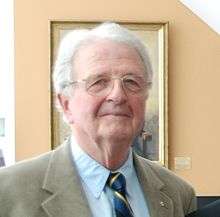Chris Hurford
Christopher John Hurford AO (born 30 July 1931) was a Labor member of the Australian House of Representatives seat of Adelaide from 1969 to 1987. He played a key role in the development of Australia's skills-oriented immigration policy, and founded the ALP Labor Unity faction in SA.
Chris Hurford AO | |
|---|---|
 Opening of the Chris Hurford exhibition at the Bob Hawke Prime Ministerial Library in 2011. | |
| Minister for Community Services | |
| In office 16 February 1987 – 24 July 1987 | |
| Preceded by | Don Grimes |
| Succeeded by | Neal Blewett |
| Minister for Immigration | |
| In office 13 December 1984 – 16 February 1987 | |
| Preceded by | Stewart West |
| Succeeded by | Mick Young |
| Minister for Housing & Construction | |
| In office 11 March 1983 – 13 December 1984 | |
| Preceded by | Tom McVeigh |
| Succeeded by | Stewart West |
| Manager of Opposition Business | |
| In office 11 February 1980 – 7 November 1980 | |
| Leader | Bill Hayden |
| Preceded by | Mick Young |
| Succeeded by | Lionel Bowen |
| Member of the Australian Parliament for Adelaide | |
| In office 25 October 1969 – 31 December 1987 | |
| Preceded by | Andrew Jones |
| Succeeded by | Mike Pratt |
| Personal details | |
| Born | Christopher John Hurford-Jones 30 July 1931 Mhow, Indore Residency, British India |
| Nationality | Australian |
| Political party | Labor |
| Occupation | Accountant |
Early life
Hurford was born in Mhow, India, to an English father and Australian mother. In 1940, his mother took the children to Perth, Western Australia where Hurford attended school, before returning to India, then to England. In 1949, his whole family migrated to Western Australia as 'ten-pound poms', despite their Australian heritage.[1] After studying at the London School of Economics, Chris Hurford worked in accountancy. He entered federal parliament in 1969, representing the Division of Adelaide, South Australia.[2] The seat had fallen to Liberal Andrew Jones during the massive Coalition landslide of 1966. However, Jones' strong conservatism did not play well in this ancestrally Labor seat, and Hurford retook the seat for Labor on a resounding 14.3 percent swing, turning it into a safe Labor seat in one stroke. Hurford actually won enough votes on the first count to take the seat without the need for preferences. He held Adelaide until his resignation in 1987.
Ministerial record
Hurford was Minister for Housing and Construction, outside Cabinet in the first Hawke Ministry from March 1983 to December 1984. In the second Hawke Ministry, he was promoted to Cabinet as Minister for Immigration and Ethnic Affairs until February 1987, when he replaced Don Grimes as Minister for Community Services.
Hurford's period as Immigration Minister was notable for his attempt to have Sheikh Taj El-Din Hilaly deported,[3] but was unsuccessful. He also made an early, unsuccessful attempt to reduce ministerial discretions in the granting of immigration visas.
In July 1987, Hurford withdrew from the third Hawke ministry for personal reasons. He retired from Parliament at the end of the year and became Australia's Consul-General in New York for four years.[4]
Internal ALP role
Within the South Australian ALP, Hurford is arguably an important modernising figure. He led the creation of the Labor Unity faction, a group variously described as "right-wing", moderate or (after the ascension of the UK Blair Government) "Third Way". A Catholic, Hurford won support from the socially conservative leadership of the Shop Distributive and Allied Trades Union in forming the faction.
In the 1980s Hurford led the SA Labor Unity group in vigorously defending within the ALP the policy direction of the Hawke Government, a direction with which the larger Centre-Left and Left factions were uncomfortable. By the 1990s Labor Unity became a substantial counterweight to the other factions in SA.
Notes
- Don Dunstan Oral History Project, Flinders University.
- "Members of the House of Representatives since 1901". Parliamentary Handbook. Parliament of Australia. Archived from the original on 17 November 2007. Retrieved 2007-11-18.
- "Former minister outlines reservations over sheik". Insiders. ABC. 29 June 2003. Archived from the original on 18 May 2006. Retrieved 18 November 2007.
- "Chris Hurford". Insiders. The Bob Hawke Prime Ministerial Library. Archived from the original on 31 August 2007. Retrieved 18 November 2007.
| Political offices | ||
|---|---|---|
| Preceded by Ralph Hunt |
Minister for Housing and Construction 1983–1984 |
Succeeded by Stewart West |
| Preceded by Stewart West |
Minister for Immigration and Ethnic Affairs 1984–1987 |
Succeeded by Mick Young |
| Preceded by Don Grimes |
Minister for Community Services 1987 |
Succeeded by Neal Blewett |
| Parliament of Australia | ||
| Preceded by Andrew Jones |
Member for Adelaide 1969–1988 |
Succeeded by Mike Pratt |
| Diplomatic posts | ||
| Preceded by John Taylor |
Australian Consul General in New York 1988–1992 |
Succeeded by Peter Curtis |